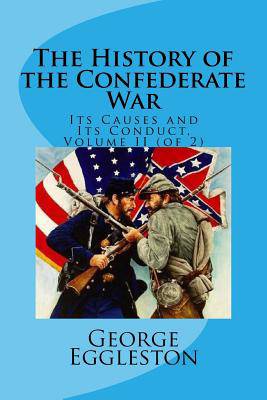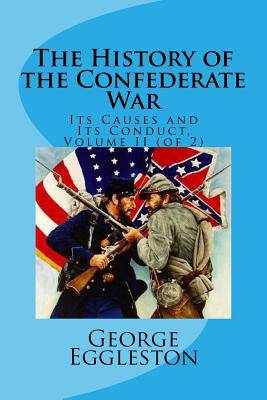
- Afhalen na 1 uur in een winkel met voorraad
- Gratis thuislevering in België vanaf € 30
- Ruim aanbod met 7 miljoen producten
- Afhalen na 1 uur in een winkel met voorraad
- Gratis thuislevering in België vanaf € 30
- Ruim aanbod met 7 miljoen producten
Zoeken
The History of the Confederate War
Its Causes and Its Conduct, Volume II (of 2)
George Cary Eggleston
Paperback | Engels
€ 25,95
+ 51 punten
Omschrijving
In the meantime great events were occurring which were in some respects more important in their bearing on the war than battles would have been. In these events the war recognized itself and adapted itself to its conditions. From the beginning the abolitionists had clamorously and ceaselessly demanded of Mr. Lincoln that he should recognize the actual cause of the war by proclaiming freedom for the slaves at the South. There was no doubt in anybody's mind that the war was simply the culmination of that "irrepressible conflict" between the systems and sentiments of free and slave labor which had constituted the burden of the country's history for nearly half a century. If there had been no slavery there would have been no war. It is true that a very large proportion of the Southern people regretted slavery, deprecated its existence, and earnestly desired to be rid of it. It is also true that the great mass of the Southerners were non-slaveholders, and that their fighting was done not for the perpetuation of that institution, in which they had no interest, but in assertion of those reserved rights of the individual states upon the maintenance of which they sincerely believed that the liberty of the people depended. These people desired to take their states out of the Union, not for the sake of slavery, but for the sake of that right of local self-government which they regarded as the fundamental condition of liberty among men.
Specificaties
Betrokkenen
- Auteur(s):
- Uitgeverij:
Inhoud
- Aantal bladzijden:
- 176
- Taal:
- Engels
Eigenschappen
- Productcode (EAN):
- 9781508853060
- Verschijningsdatum:
- 18/11/1910
- Uitvoering:
- Paperback
- Formaat:
- Trade paperback (VS)
- Afmetingen:
- 152 mm x 229 mm
- Gewicht:
- 244 g

Alleen bij Standaard Boekhandel
+ 51 punten op je klantenkaart van Standaard Boekhandel
Beoordelingen
We publiceren alleen reviews die voldoen aan de voorwaarden voor reviews. Bekijk onze voorwaarden voor reviews.











